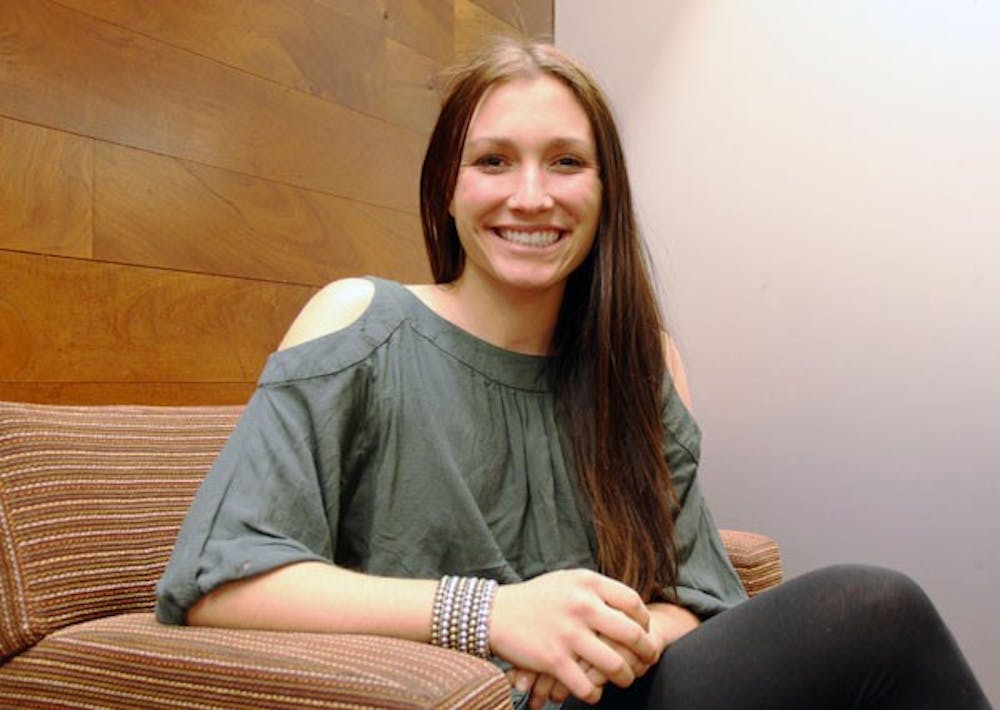 Global health sophomore Alissa Sabatino was part of a Tuesday evening panel discussion in the Memorial Union. Sabatino is recovering from anorexia and bulimia. (Photo by Shawn Raymundo)
Global health sophomore Alissa Sabatino was part of a Tuesday evening panel discussion in the Memorial Union. Sabatino is recovering from anorexia and bulimia. (Photo by Shawn Raymundo)Global health sophomore Alissa Sabatino grew up as a competitive dancer. By the time she was 12 years old, she had begun to count calories and write down everything she ate.
“I was in an environment where I was always in front of a mirror and using my body as a tool,” she said. “That’s how things started. I was over-aware of my body.”
Sabatino spoke Tuesday at an informational panel as part of Body Pride Week at the Tempe campus.
“I suffered from bulimia and anorexia, and I have been in recovery for two years,” she said.
Bulimia is characterized by episodes of binge eating followed by purging behaviors such as self-induced vomiting. Anorexia is characterized by the refusal to maintain a normal body weight.
When she was 14 years old, Sabatino realized she had an eating disorder. A year later, she told her mother, Jill, that she needed help.
“She told me she didn’t want me to worry about her,” Jill said. “But I would hear her late at night.”
Jill hired a life coach for Sabatino, but they did not get the results they wanted.
The coach focused on school and other issues, but not the eating disorder.
“I called her, and I said, ‘She’s still doing this,’” Jill said.
Sabatino and her mother looked into different outpatient options to help her overcome the disease after the coach recommended them.
She chose Santé Center in Chandler.
“I was probably seeing a therapist for a year,” she said. “So in the grand scheme of things, it’s not very long, but I was really determined.”
Food was an out from the stress of trying to be perfect, Sabatino said.
The disorder was affecting her mentally and physically, she said.
“I wouldn’t eat dairy, because I thought it would make me gain weight,” Sabatino said. “Everything had to be organic. … I wouldn’t eat animal products.”
Sabatino went to see a doctor before telling her mother because she was bruising very easily and her menstrual cycle was becoming irregular.
The doctor did not even think it might be an eating disorder, and gave her birth-control pills.
“It’s a very isolating disease, because no one really talks about it,” she said. “You can have people around you that love you and care about you, but you still feel distant from them.”
Sabatino quit dancing in an effort to recover from the disorder.
“Instead, it kept manifesting in other ways,” she said. “Finally, I got help my senior year at high school.”
The disease controls sufferers, she said.
Sabatino’s relationship with her family deepened after telling them about her disorders, she said.
Her father, Steve, said he was not surprised because she has always been a perfectionist.
“I was so glad she was getting help,” he said.
Eating disorders are stigmatized and rarely talked about in American society, Sabatino said.
“I remember feeling really embarrassed,” she said. “I didn’t want to talk about it with my family … or anyone around me.”
This was Sabatino’s second time speaking at an information panel.
Recovering from the disease was the hardest thing she ever had to do, Sabatino said.
“Trying to break a habit like that is very hard,” she said. “Even now, it’s not like I’m completely recovered. I still have to snap myself back into place sometimes.”
Once Sabatino went to Santé Center, she started seeing a therapist, a psychiatrist and a nutritionist. .
To overcome an eating disorder, one has to have the drive and the want to do it, Sabatino said.
“I surround myself with positive people,” she said. “I just remind myself not to be hard on myself. I don’t have to be perfect.”
People should seek professional help if they suffer from eating disorders, Sabatino said.
When she wants to exercise now, Sabatino hikes with friends or enrolls in classes at the Student Recreation Center.
Sabatino said she now feels satisfied with what she sees in the mirror.
“I feel more confident in myself,” she said
“She used to say to me, ‘I just don’t feel good,’” Jill said. “I think now she feels pretty good.”
Reach the reporter at dpbaltaz@asu.edu or follow her on Twitter @dpalomabp




